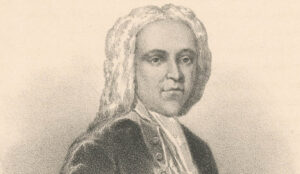Americanism Redux
July 23, 250 years ago today
He is, literally, a hot head on this summer day. It’s hard not to be when you’ve got sweat on your head.
The sweat of his scalp spreads out from the roots of his hair. The woven fibers laying over them are soaking up the perspiration. His nose detects the faintest scent of olive oil, a sign that his servant has cleaned the fibers while forming them into gentle curves that hang low and cover his ears. Sprinkles of a grayish-white powder cling to the matted hair taken from a goat, the tail of a horse, or the hair someone sold from their own head.
Trying to appear comfortable and at ease, Thomas Cushing looks out at the men gathered before him. He is the Speaker of the General Court of Massachusetts Colony, convened in Boston at the statehouse. He sits in a large chair and wears his fashionable wig, the style of men and women who boast of money, influence, and position.
But the damn thing does get hot.
The bewigged Cushing announces to the bewigged elected members of the colonial legislature that their meeting is now ended and adjourned. He turns to the Court’s secretary who will ensure that the group’s officially written and approved statement—the petition—will be folded up, placed in a large packet, and carried down to a ship waiting at the docks. The ship and its contents, the petition and everything and everyone on board, will set sail for England and the desk of bewigged 34-year old King George III.
The petition that moved from Cushing’s desk to the Boston docks includes an idea that is new and explosive.
Three wires comprised the idea:
>>The salary of the colony’s governor should only come from the colony’s legislature—no other source is allowable;
>>If not, the petitioners asserted, the power between the governor and legislature would be disrupted, unbalanced, and tilted in favor of the executive side, the governor’s side, of the government—maintaining the proper balance is crucial;
>>The petitioners linked their argument back to a sheet of paper with words scribbled on it, the colony’s 1691 charter from the British imperial government, which they declared had been the working basis of Massachusetts for more than seven decades—that written document is the foundation beneath the structure.
250 years ago today, Cushing agrees with the idea and its three wires. He believes the British government, the king and the parliament, must hear and embrace the petition. Cushing’s fear is that if they don’t, a particular war will come. Cushing has read extensively about war possibly breaking out in Europe and if so, he knows the British imperial government will expect its colonies to join the fight like they’ve done in previous European bloodletting. The petition in the packet, Cushing hopes, will strengthen the bond between England and Massachusetts before the dreaded European war begins.
Also
Cushing has served in the Speaker’s chair for six years out of his total eleven years as an elected member of the General Court. He was on the scene back in 1764 when James Otis, a colleague, had written a controversial pamphlet asserting that God, not England, had granted rights to the people of Massachusetts. Otis had developed his thoughts in the boiling cauldron of the last European war that involved the British Empire, the Seven Years War, or the French and Indian War as the colonists in North American called it.
Cushing remembers the furor stirred up by Otis’s writings and the subsequent violence, chaos, and disorder that followed when the British imperial government passed new tax laws to help pay for that expensive war.
Cushing’s memories of this strife throughout much of the prior decade is precisely what animates him now, 250 years ago today, to try to head off problems before they reappear, before they reoccur.
Before the petition leaves the dock, Cushing writes in the margin in his own hand to inform Massachusetts’ paid lobbyist Benjamin Franklin that the General Court wants to pay him but the governor does not.
You Now
Old is old and it gets that way because it stays around. People want to dress in fashions that tell the world who they are. From shoes to wigs, tattoos to mom jeans, the style may change but the impulse does not. We may think the latest style is a new thing, but in truth it’s as old as the hills.
Sometimes, though, the old conceals the truly new. We look at the surface and we stare at the style and we understandably think it’s just the latest expression of an eternal thing. Underneath is the new. It’s not the look of the hand doing the writing, it’s the words themselves that represent a breakthrough, a shift to the different, a first step in an experiment.
You look at the painting and a wigged man image stares back. Old. You know the writing he endorsed and read ideas fresh and bold and more than a little frightening. New.
Suggestion
Know the new that can appear deceptively as the old. That’s how a self-governing republic with a long history can actually be totally new on a daily basis.








